Your Solution for Wrist Arthritis at Nebraska Hand & Shoulder Institute, P.C.
Nebraska Hand & Shoulder Institute, P.C. is your trusted source for comprehensive arthritis treatment. With years of experience treating wrist arthritis, we provide top-tier care led by Dr. Ichtertz, whose pioneering strategies and extensive years of expertise ensure you receive the highest quality treatment.
We strive to offer the best wrist arthritis treatment and surgical services in Nebraska, delivering professional care and innovative solutions to improve your quality of life. Trust us to support you through every step of your treatment journey.
Understanding Wrist Arthritis
Wrist arthritis is often degenerative, inherited, and generally manifests in your later years. Trauma-related joint decay is also common, often linked to a previous injury that may have disrupted wrist joint mechanics. A neglected fall years before may have torn a ligament, resulting in joint instability and cartilage breakdown due to the abnormal mechanics of the eight wrist (carpal) bones.
While there are different forms of arthritis, they usually follow a degenerative path that can culminate in conditions like scapholunate advanced collapse (SLAC). A minority of patients have inflammatory arthritis due to autoimmune diseases such as rheumatoid arthritis (RA) or systemic lupus erythematosus (SLE). Gout, a metabolic disease caused by the accumulation of monosodium urate crystals, is rarely encountered in the wrist.
Many individuals experience pain at the base of their thumb, often diagnosed as carpal/metacarpal (CMC) arthritis. At Nebraska Hand & Shoulder, we frequently see patients presenting with this condition, and over half of them also suffer from carpal tunnel syndrome simultaneously. During our comprehensive examinations, we differentiate the specific source of thumb pain, which could stem from various conditions:
- Pain at the base of the thumb usually indicates arthritis.
- Pain at the palmar aspect at the first crease of the thumb suggests trigger thumb, which may evolve into painful snapping.
- Pain in the fleshy part of the thumb is often due to carpal tunnel syndrome, even if there is no accompanying numbness.
- Pain on the radial side where the thumb meets the wrist is typically De Quervain's Tendonitis.
Given that many patients may have more than one of these conditions, our thorough diagnostic process includes a Nerve Conduction Study (NCS) to confirm carpal tunnel syndrome and a Robert's X-ray to diagnose arthritis. We avoid unnecessary MRI or EMG tests, thereby saving our patients both time and money.
Treatment Options
At Nebraska Hand & Shoulder Institute, P.C., we provide multiple treatment options, ranging from wrist denervation to wrist arthroplasty. Our process starts with a thorough assessment of your condition, followed by recommendations for the most suitable treatment tailored to your needs.
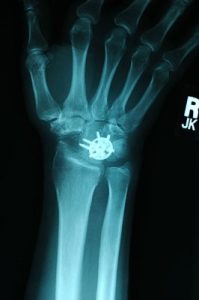
Limited wrist fusion and scaphoid excision and 4 corner, limited fusion
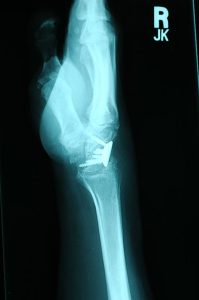
Side view x-ray after fusion
Surgical Options
Wrist Denervation
The initial option we generally suggest for patients experiencing midline, top of the wrist or palmar wrist pain from arthritis is denervation. The procedure involves neutralizing the posterior interosseous nerve, which can significantly reduce or even eliminate pain.
Thumb Denervation
For treating arthritis at the base of the thumb, we recommend denervation, a minimally invasive procedure offering the fastest relief with the lowest pain and quickest recovery. While traditional resection (bone removal) procedures are slightly more definitive, they come with significantly more pain and a longer recovery period of about six months.
Denervation is a great initial option as it does not preclude other treatments if needed. It is a definitive procedure with lasting results, though there is a risk of temporary or permanent numbness in a small area around the top of the thumb (never on the palm side). This approach reinforces our commitment to providing effective, patient-centered care.
When Denervation Doesn't Suffice: Other Surgical Options
If wrist denervation does not provide sufficient relief or is not feasible due to severe arthritis, we offer additional solutions such as partial or total wrist fusion, and in rare cases, total wrist replacement or wrist arthroplasty.
Wrist Arthroplasty – An Option for Severe Cases
While wrist arthroplasty, or total wrist replacement, is not commonly performed due to potential complications, it is sometimes the best option for certain patients, particularly older individuals with non-responsive severe arthritis.
Dr. Ichtertz performed the first Freedom Total Wrist in Nebraska, and that patient is still going strong!
Comparison of Procedures
| Proximal Row Carpectomy |
Wrist |
Limited |
Total Wrist |
Total Wrist |
|
|
Down Time (recovery) |
3-4 weeks | Zero | 2-3 mos. | 3 mos. | 6 weeks |
| Wrist Motion | Good | Unchanged | Partial | None | Full |
Your Wrist Arthritis Surgery: What to Expect
Depending on the severity of your condition and the nature of your job, post-surgery recovery may require a few days to a few months. Our expert team will guide you through the process, assisting with postoperative care and recovery strategies.
Schedule Your Appointment Today
Our goal is to help you regain a pain-free, functional life. Schedule your appointment with us today and embark on your journey towards improved wrist health.
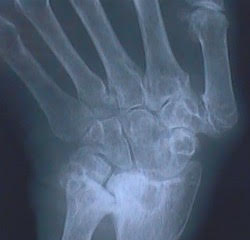
Eight Bones in Wrist Look Like Three After Joint Destroyed by Arthritis
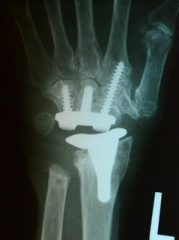
Pain Free After Freedom Total Wrist Joint Replacement
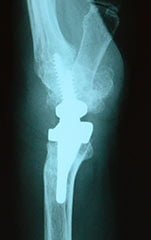
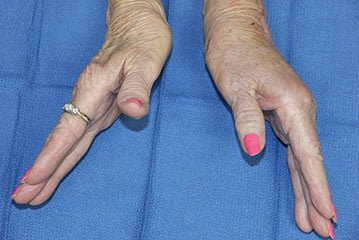
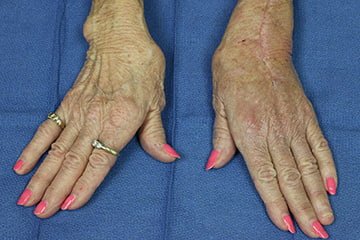
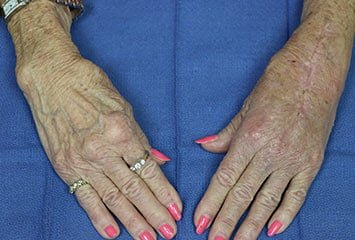
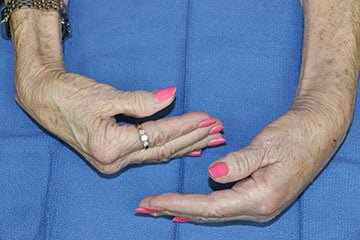
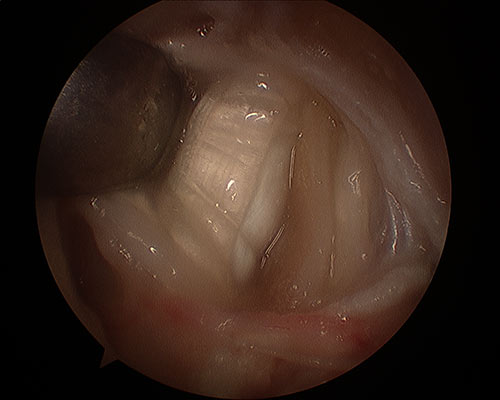
Open Denervation
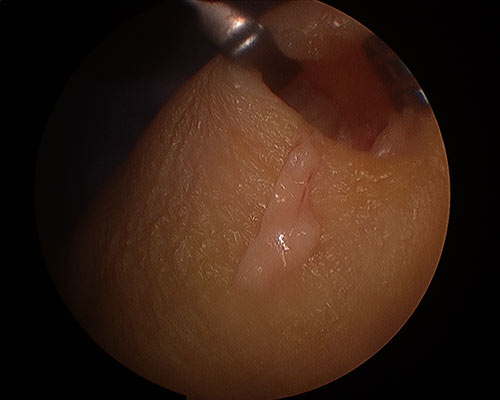
Open Denervation
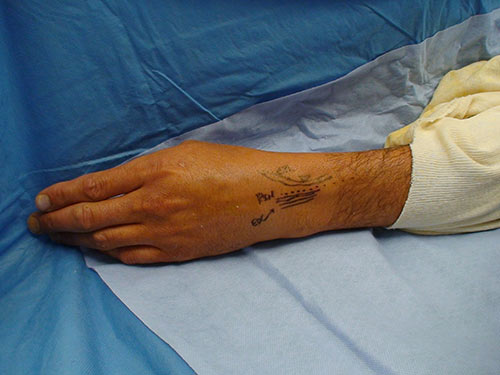
Percutaneus Denervation
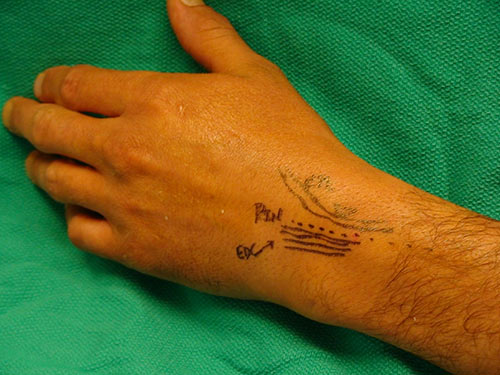
Percutaneus Denervation
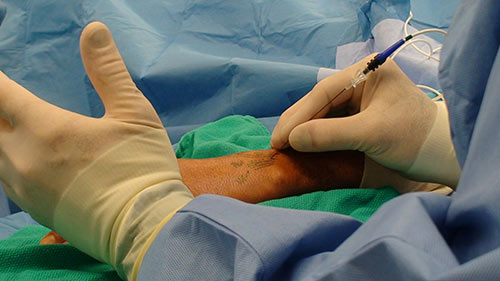
Percutaneus Denervation



